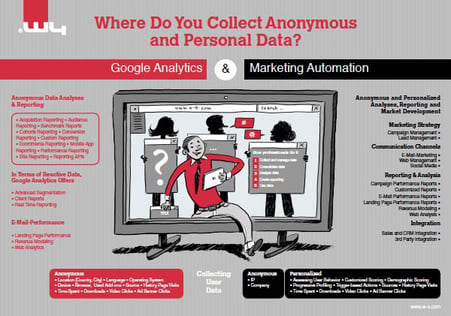Track, analyze, optimize – marketers know this process by heart. There are many tools for analyzing user behavior online. Experience has shown that a combination of two systems has offered the best data base for online marketing campaigns: Google Analytics and marketing automation solutions like Eloqua, HubSpot or Act-on. Eloqua for example perfectly complements the classic web analyst Google and simplifies marketers' job of using the collected information to optimize the sales approach.
Table of contents
- Web Analyses with Google Analytics
- User-Tracking with Marketing Automation
- Tracking Anonymous vs. Known Users: When and Why It Matters
- Data Privacy and Compliance in Anonymous Tracking
- Combining Strengths: Google Analytics Meets Marketing Automation
- Real-World Use Cases: Combining Google Analytics and Marketing Automation
- Our services
Web Analyses with Google Analytics
The tool of search engine giant Google analyzes and documents a website's traffic anonymously.
The tracked data on the performance of desktop and mobile sites, apps, blogs and shops are documented in reports. Moreover, Google Analytics also makes available some personal information:
- location (country, city)
- language
- operating system
- device
- browser, add-ons
- display resolution
- source (search engine, social media etc.)
- history of page views
- time spent
- downloads
- video clicks
- banner clicks
In short: Google Analytics measures and analyzes the interactions on websites as well as their reach. Tracking and evaluating the interests, behaviors and reactions of users are the tool's core features.
Click on the image to download our infographic in high resolution for free.
Anonymous User Data Are the Basis
Since IP addresses remain encoded and Google creates an user ID for every user, the tool cannot provide information about individual users. The anonymous data become part of the various analysis parameters. That is why the user engagement only has a limited value when companies are looking to optimize individual sales approaches.
Nevertheless, anonymous user data can be very helpful during the first stage of the customer journey. After all, this is the stage when users research demand-related information without giving up any of their contact information.
User-Tracking with Marketing Automation
New software solutions for marketing automation such as Eloqua track users' online behavior anonymously as well. However, there are two very important differences:
1. Anonymous users are already assigned a company name (if there is one). This results in many advantages for business development.
2. The systems are able to create and supplement a user profile dynamically once users return to the website and enter contact information (email, name etc.) into forms.
This way, with every visit to the website, the software is able to supplement a user profile with more information. This assists marketers to determine whether a lead is ready to become a client. The information is available in real-time. One-fits-all campaigns can be replaced by individual lead nurturing campaigns. The customer journey automatically becomes a customized experience. Using the data collected by Eloqua, HubSpot or Act-on, the software can display relevant information proactively at the relevant touch points for individual users. This maximizes conversion rates tremendously.
Personas Categorize User Profiles
Before a marketing automation systems goes live, target groups with specific characteristics, the so-called personas, are defined. The system tags users with one of these personas according to their behavior. This assignment is verified every time a user downloads content. Businesses use this as an opportunity to address individual users according to their interests or their personality on websites, in emails or mailings.
If it is your goal to provide marketing and sales with actionable data in real time, marketing automation solutions are superior to Google Analytics. They save and assess user profiles according to a scoring model and evaluate them according to sales chances in a single system that both sales and marketing teams can use simultaneously.
Tracking Anonymous vs. Known Users: When and Why It Matters
Anonymous tracking plays a crucial role in the early stages of the customer journey. It helps marketers understand what content attracts attention and how users interact with a site—without collecting personal data. This is especially useful for building awareness and capturing demand signals.
As users engage more—by downloading gated content, signing up for newsletters, or filling out forms—they become known users. At this point, marketing automation platforms like Eloqua or HubSpot begin enriching their profiles with every interaction.
This shift from anonymous to identified allows marketers to move from generic messaging to highly personalized follow-ups. You can trigger targeted email campaigns, assign lead scores, or alert sales teams when a contact is ready to buy. The transition isn’t just about data—it’s about delivering the right message at the right time to the right person. And that’s what turns visitors into customers.
Data Privacy and Compliance in Anonymous Tracking
In today’s privacy-first landscape, tracking user behavior must go hand in hand with respecting data protection laws like the GDPR. Tools like Google Analytics rely on anonymous tracking, where user data such as IP addresses are masked and analyzed without identifying individuals. This method is generally compliant when used with proper cookie consent mechanisms.
However, it’s important to understand the difference:
- Anonymous data cannot be traced back to a person.
- Pseudonymous data (like user IDs) can be linked to a profile, but not directly to an identity.
- Personal data includes names, emails, or anything that clearly identifies someone.
Combining Strengths: Google Analytics Meets Marketing Automation
Both Google Analytics and marketing automation tools supply businesses with valuable information on the online behavior of users to verify digital marketing strategies.
Marketing automation solutions have an emphasis on workflow to facilitate the cooperation between sales and marketing departments. Beginning with the visit to a page, the system starts to gather information and create a user profile once sufficient contact information was made available. If users are actively engaging with content on a website, the system supplements the profile. Marketing can then forward the client to the sales department once they think the lead is ready to become a paying customer.
Google Analytics was developed for specialists. It collects a lot of important traffic data. However, this information is only anonymous. The tool's purpose is to verify the effect of your online activities. Marketers receive a feedback that tells them whether they have to invest in other measures, such as Google Adwords or new pages with more information. The process of “publishing – tracking – analyzing – adjusting” puts site operators in a reactive position. Even though Google Analytics offers the optional Custom Alerts feature, these alerts only refer to previously defined user groups, but never individual users.
Google Analytics by itself does not offer much of a competitive edge when the objective is to offer users a customer journey that fits their individual needs. However, combined with a powerful marketing solution like Eloqua, companies have exactly the tools for analysis they need to successfully manage their digital marketing activities.
Combining Google Analytics and Marketing Automation has the following advantages:
✓ You combine the most effective and proven tools for analysis
✓ You know more about your traffic than the majority of your competition
✓ You can react to the preferences of your customers proactively
✓ Marketing and sales cooperate more effectively
✓ The quality of usable data increases
Real-World Use Cases: Combining Google Analytics and Marketing Automation
Bringing together Google Analytics and marketing automation creates a powerful toolkit for smarter, data-driven marketing. Here are a few practical examples:
1. Identifying Top-Performing Content
Google Analytics shows which blog posts or landing pages get the most traffic and engagement. You can feed this insight into your marketing automation tool (like Eloqua or HubSpot) to create targeted email campaigns or lead nurturing workflows around that high-performing content.
Impact: higher conversion rates and better content ROI.
2. Retargeting Interested Visitors
Let’s say GA reveals visitors who spent over two minutes on a product page but didn’t convert. You can sync that behavior with your automation system to trigger follow-up emails or personalized ads.
Impact: improved lead quality and lower bounce rates.
3. B2B Lead Scoring and Handoff
For B2B, automation platforms score leads based on GA data like visit frequency or source. When a lead hits a threshold, sales is notified immediately.
Impact: shorter sales cycles and stronger alignment between marketing and sales.
In B2C, this combination helps trigger timely promotions based on user behavior, increasing engagement and purchase likelihood. Integration helps you act on insights—not just analyze them.
Our services
W4 marketing agency gladly show you how you can use the analysis tools presented here to your benefit. We also support you in creating a customer journey map and help you to optimize your touch points. Get in touch!




.webp)






